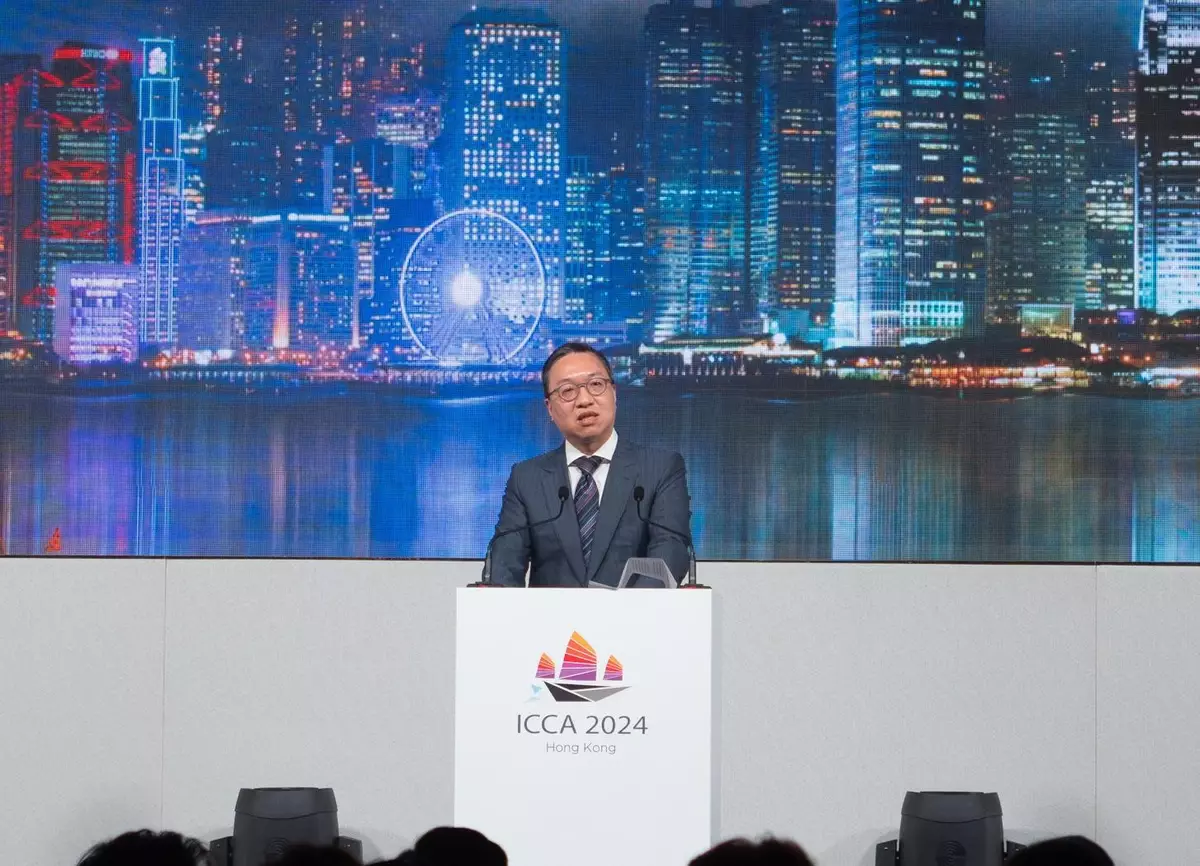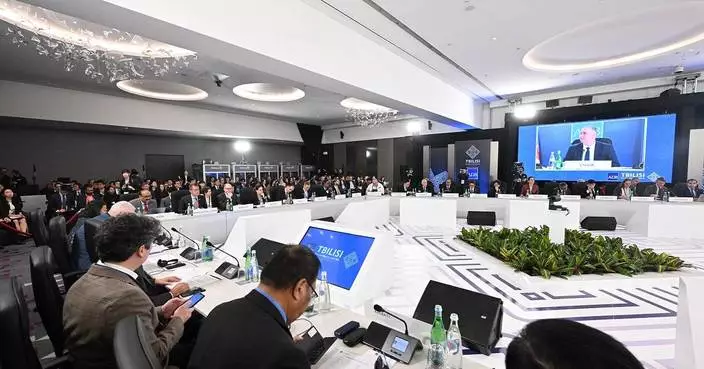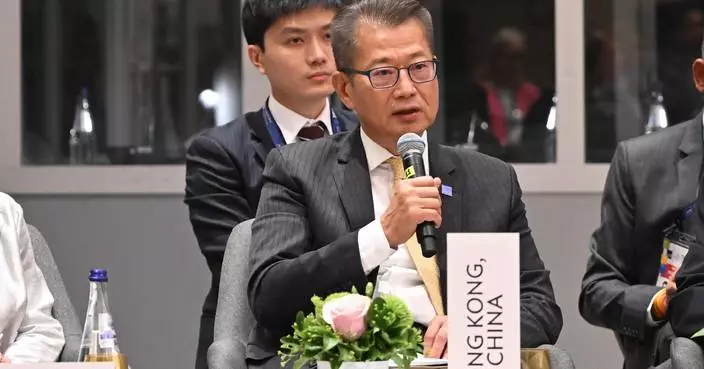Unlocking hong kong: a guide to smooth immigration clearance for visitors
Following is a question by the Hon Rock Chen and a written reply by the Secretary for Security, Mr Tang Ping-keung, in the Legislative Council today (April 24):
Question:
At present, visitors to Hong Kong are required to furnish a completed arrival card in paper form for immigration clearance. However, it is learnt that other regions, such as Japan, Korea and Singapore provide electronic versions of arrival cards for inbound visitors to fill in online before departure or entry. There are views pointing out that such arrangement can reduce the waiting time for visitors for immigration clearance, and can also reduce the physical contact between visitors and staff as well as the use of paper. In this connection, will the Government inform this Council:
(1) given that Hong Kong is an international city and is striving to develop into a "smart city", whether the authorities have plans to streamline the procedures for immigration clearance of visitors and introduce an electronic version of the arrival card; if so, of the specific plan and implementation timetable; if not, the reasons for that;
(2) whether it has collected and analysed the views and feedback of visitors to Hong Kong, so as to understand their expectations of and level of satisfaction with the existing immigration clearance procedures, and enhance the quality and efficiency of immigration clearance services in response to their needs and suggestions; and
(3) whether the authorities have exchanged views with immigration control authorities of other regions to draw reference from their experience and effectiveness in the use of electronic forms or other technologies in handling immigration clearance, and explore possible opportunities for co-operation and mutual connection, so as to bring more convenience and better experience to visitors to Hong Kong?
Reply:
President,
My reply to the questions raised by the Hon Rock Chen is as follows:
(1) and (3) The Immigration Department (ImmD) has all along reviewed its existing policies and measures regularly, and explored the use of innovative technologies proactively, with a view to providing efficient and high-quality services to the public and visitors.
According to sections 5(4) and 5(5) of the Immigration Ordinance (Cap 115), except for persons exempted by the Director of Immigration under section 5(9), any person of or over the age of 16 years shall furnish a duly completed arrival or departure card in the prescribed form on his arrival in or prior to his departure from Hong Kong. If the person concerned is of or over the age of 7 years and under the age of 16 years and is accompanied by an adult, the adult shall furnish in respect of such person a duly completed arrival or departure card in the prescribed form.
To streamline the procedures for immigration clearance, eligible Hong Kong residents and certain categories of inbound visitors (i.e. (i) holders of Exit-Entry Permit for Travelling to and from Hong Kong and Macao or a Chinese Travel Permit issued by the Mainland authorities or (ii) Macao permanent residents holding Macao Smart Permanent Identity Card) are currently not required to furnish the arrival or departure card for immigration examination. The ImmD will continue to review the arrangements of declaration from visitors upon arrival or departure from time to time.
Separately, the ImmD is also drawing reference from the experience and practices of other regions and actively studying the feasibility of introducing an electronic version of the arrival or departure card or other technologies in handling immigration clearance. The scope of study includes the related legal basis, system requirements, hardware facilities, and operational workflow, so as to further streamline the immigration arrangements and make it more convenient to visitors. The ImmD will strive to complete the relevant study by the end of this year and decide on the way forward of the improvement plan based on the study outcome.
(2) The ImmD attaches great importance to the suggestions of the public and visitors on its services and provides various channels, including telephone, fax, email or post, to facilitate the public and visitors to provide feedback to the ImmD. Immigration officers at various control points are also willing to listen to suggestions provided by the public and visitors on ground. The ImmD will examine its existing facilities and arrangements from time to time and implement improvement measures having regard to the feedback collected, with a view to further enhancing the immigration services provided to the public and visitors.

Source: AI-generated images
Empowering innovation: a recap of sj's inspiring speech at the 26th icca congress
Following is the speech by the Secretary for Justice, Mr Paul Lam, SC, at the 26th ICCA Congress Opening Ceremony today (May 5):
Dr Alexandrov (President of the International Council for Commercial Arbitration (ICCA), Dr Stanimir Alexandrov), Justin (Co-Chair of the ICCA 2024 Hong Kong Host Committee Mr Justin D'Agostino), Neil (Co-Chair of the ICCA 2024 Hong Kong Host Committee Mr Neil Kaplan), Rimsky (Co-Chairperson of Hong Kong International Arbitration Centre (HKIAC) Mr Rimsky Yuen, SC), David (Co-Chairperson of HKIAC Mr David Rivkin), Joanne (Secretary-General of HKIAC, Ms Joanne Lau), distinguished guests, ladies and gentlemen,
Let me begin by expressing my gratitude to ICCA for agreeing to host the Congress in Hong Kong, which is a very strong vote of confidence in Hong Kong as an international arbitration centre. I must also congratulate the HKIAC on its successful organisation of the Congress. The Department of Justice is indeed very pleased to be one of the supporting organisations by providing financial and other supports.
I can now understand why the ICCA Congress is hailed as the Olympics of the international arbitration community. The Olympics is renowned for the great diversity and high standard of the participants. This ICCA Congress has attracted over 1 300 leading experts in international arbitrations from more than 70 jurisdictions. This is a new record, which I believe will be extremely difficult to break.
With so many friends from other parts of the world and the Mainland, as the Secretary for Justice of Hong Kong, I feel duty bound to seize the opportunity to impress on you that Hong Kong is and will remain to be a leading international arbitration centre. I am going to recast the four letters "ICCA" as an acronym to illustrate the unique strengths and qualities possessed by Hong Kong that make it stand out as one of the best venues for international commercial arbitration.
"I" - Institutional support
"I" stands for "institutional support". Hong Kong is home to many world-class and internationally renowned arbitral institutions. As our home-grown dispute resolution institution, HKIAC has always been ranked as one of the most-preferred arbitral institutions in the world. It is very encouraging to see that HKIAC received a total of 281 arbitration filings in 2023. I think Joanne mentioned some other relevant figures. They continued to be predominantly international arbitration featuring parties from 45 jurisdictions. The total amount in dispute in all arbitration cases was HK$92.8 billion, which is equivalent to about US$12.5 billion, representing a record high for HKIAC.
Among sponsors of the ICCA Congress are other reputable arbitral institutions with offices based in Hong Kong, such as the China International Economic and Trade Arbitration Commission (CIETAC), and the South China International Arbitration Center (Hong Kong) (SCIA(HK)).
"C" - Comprehensive legal framework
The first "C" stands for our "comprehensive legal framework" in arbitration. The Arbitration Ordinance in Hong Kong forms the backbone of our arbitration framework. Coming into effect in 2011, the Ordinance is largely based on the Model Law on International Commercial Arbitration of the United Nations Commission on International Trade Law, which is familiar to practitioners from both civil law and common law jurisdictions, as well as the international business community.
Taking note of arbitration users' needs for flexible funding options, we have refined our arbitration law to specifically provide for third party funding of arbitration in February 2019. In addition, the Outcome Related Fee Structures for Arbitration (ORFSA) was fully implemented in Hong Kong in December 2022. As at March 2024, based on statistics provided by our arbitral institutions, 88 arbitration cases were disclosed to be conducted with third party funding and five cases were conducted with ORFSA.
As to enforcement, arbitral awards made in Hong Kong are enforceable in Hong Kong, and over 170 contracting parties to the New York Convention. But more importantly, Hong Kong enjoys a unique strength that is not shared by other jurisdictions. Under the principle of "one country, two systems", Hong Kong has entered into three mutual legal assistance arrangements with the Mainland on not only mutual enforcement of arbitral awards, but also mutual assistance in interim measures which allow parties to arbitral proceedings administered by the designated arbitral institutions to apply to the Mainland courts for interim measures for preservation of asset, evidence and conduct, before an arbitral award is made. As at March 2024, Hong Kong's arbitral institutions had processed 118 applications for interim measures made to the Mainland courts, and court orders in respect of over RMB16.3 billion worth of assets had been issued.
"C" - Court's pro-arbitration approach
The second "C" stands for "the Court's pro-arbitration approach". The Hong Kong judiciary has long been adopting a very pro-arbitration approach. And such an approach is confirmed by a number of recent court judgments.
Last year, a landmark judgment C v D was handed down by the Hong Kong Court of Final Appeal. The judgment recognised the distinction between admissibility and jurisdiction, and held that there is a presumption that the issue of non-compliance with a precondition to arbitration is a question of admissibility to be decided by the arbitral tribunal, thereby limiting the scope of court intervention in the arbitral process. In a more recent case of CNG v G, the Court of First Instance reaffirmed the fundamental principles that arbitration is a voluntary and consensual process of final dispute resolution; and it was stressed that the Court must not only respect the autonomy of the tribunal, but also leave the tribunal free to decide the dispute with the proper exercise of its case-management powers, when the tribunal is clearly in the best position to manage its own proceedings and procedure. Lastly, in two very recent judgments handed down around two weeks ago, Re Simplicity & Vogue Retailing (HK) Co Ltd, and Re Shandong Chenming Paper Holdings Ltd, the Hong Kong Court of Appeal noted and ruled that, save in wholly exceptional circumstances, the court should decline to entertain a petition for winding up or bankruptcy when there is an arbitration agreement concerning the debt in question.
"A" - Accessibility to the international legal community
Lastly, the letter "A". Letter "A" stands for the accessibility to the international legal community. I wish to emphasise that the international arbitrations in Hong Kong are accessible to the international legal community. There is no doubt that Hong Kong itself has a very strong tool of legal talents specialised in international arbitrations. This is demonstrated by the large number of sponsors and organisers of not just official events but side events, many of which are leading law firms and barristers' chambers in Hong Kong.
But the point that I really wish to make is that Hong Kong welcomes friends from the Mainland and other parts of the world to take part in international arbitrations conducted here. As an example, to enhance immigration convenience, last year, the Government has expanded the Pilot Scheme on Facilitation for Persons Participating in Arbitral Proceedings in Hong Kong for all visitors to participate in arbitral proceedings here as arbitrators, expert and factual witnesses, counsel in the arbitration, and parties to the arbitration, without the need to obtain any employment visa. From March 2023 to March 2024, 96 persons were allowed to participate in Hong Kong arbitral proceedings without the need to obtain any employment visa under the scheme.
I truly and firmly believe that Hong Kong's reputation as a leading international arbitration centre is well deserved. However, to enable Hong Kong to maintain and enhance such a status, we need your trust and support, in particular, those of you from overseas. Seeing is believing. I hope that, apart from taking part in the official and side events of this ICCA Congress, you will have the chance to experience the Hong Kong life including our delicious food, unique culture and beautiful scenery. I am sure you will be convinced that Hong Kong remains to be a very open, friendly and diversified international society with a solid foundation based on the rule of law.
On this note, I wish to say thank you again, and I wish you all a pleasant evening in celebrating the commencement of the ICCA Congress, and of course, a very fruitful, constructive and pleasant stay in Hong Kong. Thank you very much.

Speech by SJ at 26th ICCA Congress Opening Ceremony Source: HKSAR Government Press Releases









